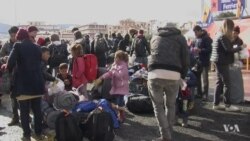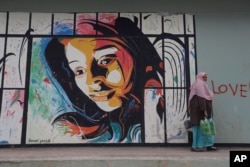It's been a year since the European Union signed a deal with Turkey to stem the flow of migrants from the Mideast and Asia into Greece, in return for $6 billion in aid. On the surface, the deal appears a success, as the numbers arriving on Greek shores have fallen by over 90 percent.
But aid agencies say the figures disguise the hardship still being felt by 60,000 migrants stuck in camps or unable to find safety as the borders through the Balkans to Western Europe remain closed.
Aid groups accuse the European Union of abandoning its responsibilities.
"Certainly, when we are on the ground treating the patients, and we are seeing the suffering that is a consequence of the EU-Turkey deal, we can not say that that is a success," said Declan Barry of Doctors Without Borders, who spoke to VOA via Skype from Brussels. "In human terms, it is a failure. When these refugees are detained and held in camps, we are seeing an awful lot more people with profound mental health disorders, and that includes psychosis, post-traumatic stress disorder, a lot of anxiety and depression."
But European Union officials say hundreds of lives have been saved by breaking up the people-smuggling gangs.
Manageable influx
EU Commissioner for Migration Dimitris Avramopoulos said results of the deal with Turkey were positive; the numbers have fallen dramatically compared with a year ago, when 10,000 people passed through Turkey onto European soil. He said the numbers had fallen to 60 people per day, a manageable figure.
Avramopoulos called on EU states to speed up the relocation of asylum-seekers. France signed a deal Tuesday to take in 500 Syrian refugees from Lebanon. It is hoped offering safe passage will ease the pressure on Europe's borders.
Valerie Regnier of the Community of Sant'Egidio, a Christian group that is taking part in the resettlement, said it is possible to offer an alternative to the deadly trip through the Mediterranean by taking these people away from human traffickers.
Meanwhile, Turkey's foreign minister has warned the migrant deal is at risk as the European Union has delayed giving Turkish citizens visa-free travel, a key part of the agreement. Brussels wants Ankara to first modify its strict anti-terror laws.















